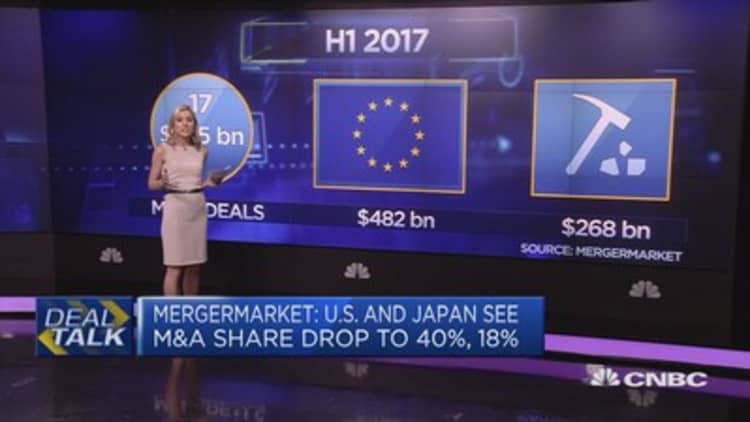
Merger and acquisition (M&A) deal value in the U.S. in the three months to the end of June slipped to its lowest quarterly total since 2013 as a lack of clarity over President Donald Trump's hoped-for corporate reforms hit buyer appetites.
Despite heady promises made during last year's election campaign and in the early days of his presidency, Trump's administration has so far failed to deliver on his widely heralded tax and antitrust amendments.
The slowdown in U.S. deals in the first half of the year saw the region notch up 2,446 announcements at a total value of $602.6 billion versus 2,677 announcements at a total value of $588.5 billion a year ago, according to data released Tuesday by Mergermarket. This led to the region's share of global activity slipping by 2.4 percent to 40.4 percent for the period.
Just as political instability ratcheted up in the U.S., across the proverbial pond a perceived dissipation of political and economic concerns helped Europe to pick up the mantel and deliver a bumper first half for the region. Activity surged by over 30 percent year-on-year with $481.9 billion worth of deals announced as euro zone sentiment was boosted by French President Emmanuel Macron's decisive victory in May and an ongoing stabilization in regional economic data.
"Political changes always threatens M&A activity and we've seen how more stable situations in Europe can lead to growth in the M&A market. In terms of the U.S., we've seen dealmakers start to hold off as they wait to see how issues such as tax reform and the potential repeal of Obamacare develop," said Jonathan Klonowski, EMEA research editor at Mergermarket.
Meantime, the negative effect of political uncertainty was demonstrated in the U.K. where this year's first half activity slumped by nearly 50 percent compared to the preceding six month period, on the back of an inconclusive prime ministerial election and the cautiously awaited kick off of Brexit negotiations.
Corporate buyers have enjoyed the effect of several factors in recent years – including booming share prices which have improved some companies' ability to make acquisitions using shares, low bank financing rates for cash purchases and surging cash levels on balance sheets –but potential threats to their ability to continue their acquisition spree are solidifying in the form of more aggressive private equity players and increasingly hawkish central banks.
Private equity activity boomed by just under a third in the first half of this year and the sector's dry powder remains at a record level, according to Karri Vuori, head of M&A at Panmure Gordon, who believes the outlook for both corporate and private equity activity remains buoyant.
"We see no near term signs of credit drying up and debt pricing remains at record lows as well so the two key ingredients of the M&A boom remain in place and the macro backdrop continues to look strong," he observed.
"Gradual interest rate hikes will no doubt start to feed through into debt pricing and this may in time feed to more conservative multiples being paid on deals rather than deal volumes as private equity players in particular are still chasing deal flow," he added, noting that rather than hawkish central bankers being his primary concern, he sees overstretched consumer credit wobbling further down the line as more likely to pull the curtain on deal making appetite.
But not everyone is so sanguine on the attractiveness of the opportunities remaining for private equity after years of turnaround successes for these buyers.
"Private equity firms are under pressure from investors to deliver growth and increasing valuations are only going to make the market tougher. Opportunities which can provide healthy returns remain but they are tougher to find. In many areas the main players have already been snapped up and private equity houses may have to pursue more niche opportunities," said Mergermarket's Klonowski.


